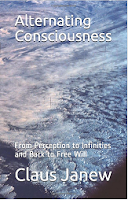If we can exist only in the constant change of the
point of view (sensory, psychic, mental) and this must apply analogously to
every place of effect (hardly has it worked, it is different), how then
stability, something constant arises?
Of course, by repeating the alternation: of thought, of way of looking at things, of mutual confirmation, of effect. Quite exactly, the change can be repeated only for an infinitely short moment; then it must already reach beyond the repetition in order not to cancel itself out. That is, it changes altogether and thereby remains open. For stabilization, approximate repetition is sufficient, though. So we believe approximately the same thing for a long time.
Why again do we repeat ourselves at all? Because otherwise everything would disappear again immediately,
existing only for an infinitely short moment. But if something has gained
minimal stability and thus formed an entirety,
this can have a further stabilizing effect, since a change with it as such now also contains more repetition: Each alternation
contains its sides, after all, and
thus "brings" something from each side into the other. If one of them
is relatively constant, the other one is "addressed" again and again
in a similar way and thus "seduced" to constancy. Or it loses the connection
at some point.
In the so-called "matter" it happens not
differently: It stabilizes itself in this way in molecular interactions thus
forming mountains, table and climate. Since it is nothing but small and big
alternations of the place of effect, the whole alternation can be traced in
principle up to the human brain and its mind - and vice versa from the mind
into its brain into its environment. We find manifold intermediate
stabilizations of emotional-mental, mechanical, electromagnetic, other and
unknown kind, all contributing to our relatively steady world, but never
self-contained.
Now, however, the entirety of an alternation is, as
described, a consciousness structure (see Consciousness I and Consciousness II).
Consequently, we are dealing with forms of consciousness everywhere - with more or less Freedom of Choice (see
there as well as Subconscious) and an increasingly unknown depth (see Awareness I
and Awareness II). We live in a world of the choosing consciousness or
awareness. So constancy is willed.
We humans, for example, create legal laws; animals,
plants and bacteria form their own social rules; and the inter-actions of
"matter" also fit into regularities, so-called "laws of
nature." However, from the relative openness of every alternation system follows
equally that it can change at any time with a certain probability. Therefore,
even "laws of nature" must be relative in some way.
Their stability in experimentation is based - like
that of our living world - on relatively closed "collective" interrelationships.
They mean the far-reaching exclusion of alternative paths of alternation and
favor mutual "dependencies." What we believe, we look for and find
with higher probability, and what we mostly find, we believe. We alternate
there again and again, with all others pointing us to it, and suppress the
seemingly inappropriate "rest". Ultimately, what is found and what is
believed are inseparable and possible deviations are aberrant. And we are even
right about that: Our Reality Funnel is established.
Only of what we cannot change despite deliberate openness, we do not yet know why it resists. On the other hand, it
would also be strange if we had unlimited potential with limited knowledge of
the world - or if we understood our deepest intentions.
Alternating Consciousness. From Perception to Infinities and Back to Free Will

